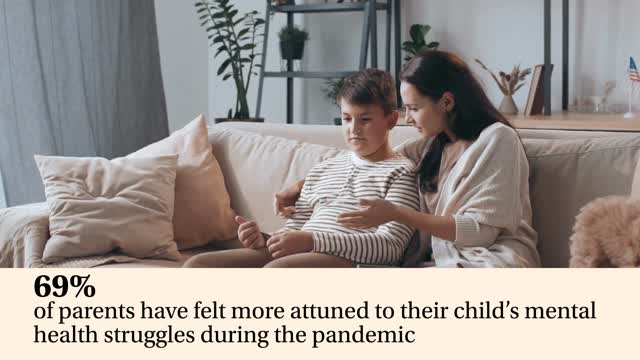Premium Only Content

Key tools that have become go-to solutions because of therapy
New research suggests children are just as stressed out as their parents – and the pandemic may be to blame.
A recent survey of 2,000 American parents revealed that since the pandemic began, 68% have seen their children face significant mental and emotional challenges, like heading back to in-person school (44%), adjusting to remote learning (38%) and grieving the loss of loved ones (28%).
Half believe that missing life milestones, such as participating in graduation ceremonies and birthday parties, has negatively impacted their child’s mental health.
Parents have also faced mental health challenges during the pandemic — the leading challenges faced were work (45%), school (41%) and making new friends (36%). Child stress also affects parents, too, since 77% said they feel stressed if their children are themselves.
As a result, 63% of parents have sought a therapist for themselves, their children, or entire family, according to the research conducted by OnePoll on behalf of LifeStance, a provider of virtual and in-person outpatient mental health care.
Parents cited their child’s lack of socialization (47%), showing signs of depression or anxiety (45%) or losing interest in their favorite activities (40%) as the top reasons they sought therapy for their child.
When looking for a therapist, parents took note of the most important things they look for — someone who can address their child’s mental health symptoms (42%), can offer both virtual and in-person sessions (33%) and can improve their relationship as a family (32%).
The research found it takes the average child five therapy sessions before they start to feel comfortable with their therapist.
Eight in 10 (84%) parents who have sought help said their family now openly talks about their therapy sessions and 37% believe that therapy has helped them feel closer to their family than ever before.
Over two in five (44%) felt they have a good support network established within their family and friends to help them support their child’s mental health.
“When a child is experiencing a physical health condition, most caregivers don’t think twice about reaching out to their pediatrician. Yet, emotional issues in children can be trickier to spot and, understandably, some parents may not know how or when to involve a mental health professional,” said Dr. Anisha Patel-Dunn, Chief Medical Officer, LifeStance.
“Mental health should be treated no differently than physical health—they’re incredibly intertwined, and both play a critical role in children’s wellbeing and development.”
Half (49%) of parents rejoiced that therapy has given them a better understanding of how to navigate through difficult situations that may arise in the future.
Both parents and children alike shared the same key tools learned from therapy that have become their go-to solutions for coping with stress and anxiety — meditation (49% and 32%, respectively), doing relaxing activities (45% and 47%, respectively) and exercise (40% and 41%, respectively).
The research also discovered that parents help their children cope with their stress by encouraging them to be honest and open (49%), talk about what’s bothering them (46%) and do fun activities together (44%).
Nine in 10 parents who help their child cope with their stress using these tactics have found it successful.
Overall, 69% said they’ve felt more attuned to their child’s mental health during the pandemic. Seventy-one percent added they’re knowledgeable about their child’s mental health state.
Half of parents talk to their child about mental health at least a few times a week, if not daily. And 72% believe their child feels comfortable coming to them with any issue.
“The United States is in the midst of a mental health epidemic, and our children are facing many unprecedented challenges,” said Dr. Patel-Dunn. “While seeking out a therapist may feel intimidating, it’s the best thing you can do when you or your child are struggling – early prevention to address problems before they become larger issues is critical.”
TOP 5 CHALLENGES PARENTS HAVE FACED THE PANDEMIC
Work - 45%
School - 41%
Making new friends - 36%
Remote learning - 35%
Grieving the loss of a loved one - 31%
TOP 5 CHALLENGES CHILDREN HAVE FACED THE PANDEMIC
School - 44%
Remote learning - 38%
Making new friends - 30%
Grieving the loss of a loved one - 28%
Moving - 28%
-
 0:43
0:43
SWNS
12 days agoWhere are Americans thrifting in 2025?
381 -
 LIVE
LIVE
Major League Fishing
2 days agoLIVE! - Fishing Clash Team Series: Challenge Cup - Day 1
3,375 watching -
 8:31
8:31
MattMorseTV
1 day ago $1.48 earnedTexas just did the IMPOSSIBLE.
64.1K83 -
 LIVE
LIVE
Rotella Games
18 hours agoGreen Hell Day 6 | We Have a LONG Way to Go
182 watching -
 LIVE
LIVE
Lofi Girl
2 years agoSynthwave Radio 🌌 - beats to chill/game to
232 watching -
 41:26
41:26
The Mel K Show
5 hours agoMel K & Clay Clark | Financial Success Hides Behind Self Discipline: Five Pillars | 8-24-25
31.9K3 -
 LIVE
LIVE
The Rabble Wrangler
13 hours agoThe Best in the West Plays Battlefield 2042 | Road to BF6 Grind
30 watching -

JTtheSG
2 hours agoLIVE Replay - Back To The Deadzone!!!
13.8K -
 LIVE
LIVE
The Official Steve Harvey
13 days ago $5.14 earned24 HOURS OF MOTIVATION w/ STEVE HARVEY
263 watching -
 25:56
25:56
DeVory Darkins
23 hours ago $0.86 earnedTrump drops ULTIMATE BOMB on Democrat Mayors as ICE makes SHOCKING Announcement
52K184